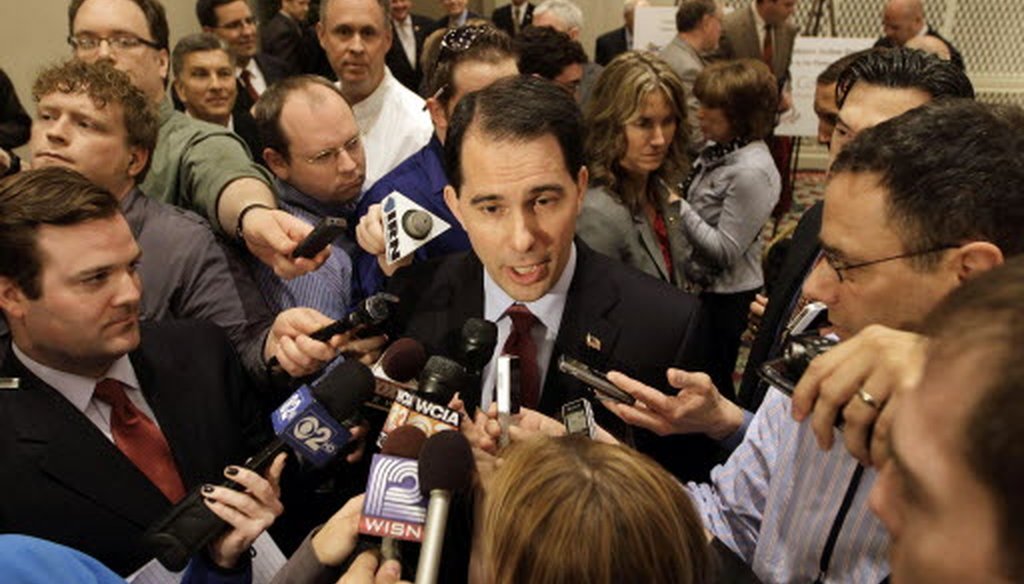Stand up for the facts!
Our only agenda is to publish the truth so you can be an informed participant in democracy.
We need your help.
I would like to contribute

Gov. Scott Walker addresses the media after speaking to the Illinois Chamber of Commerce in Springfield, Ill.
Gov. Scott Walker’s persistent bashing of Illinois’ severe budget woes and gigantic tax hikes boomeranged last year into criticism from the Land of Lincoln about Wisconsin’s bottom-feeding job-creation record among the states.
National observers have taken note: The hate-hate affair was a topic when Walker guest-hosted CNBC’s "Squawk Box" program July 9, 2012.
CNBC’s Joe Kernen, one of the hosts, challenged Walker on his tax critique, asking, "Isn’t Illinois still below your corporate tax rate?"
"No," Walker responded, emphatically. "They like to make that point, but they have a personal property tax on top of it, (making it) 9.5 percent versus ours at 7.9 percent."
Illinois Gov. Pat Quinn has indeed claimed that "even with the temporary increase, Illinois' personal and corporate tax rates are lower than Wisconsin's and comparable to other nearby states."
So is Walker correct that Wisconsin’s rate is now lower than Illinois when an apples-to-apples analysis is done?
Or is Quinn on target?
We decided to dig into the question as part of our "Behind the Rhetoric" series, aimed at providing context and perspective on some of the hot topics in the political debate.
Let’s start with an easy number: Wisconsin’s corporate tax rate is 7.9 percent, as Walker noted. There’s only one rate.
In Illinois, the corporate income tax rate consists of two parts -- a 7.0 percent income tax and a 2.5 percent "replacement tax" that is also based on a business’ income, the Illinois Department of Revenue’s website explains. If you add those up, as Walker did, it’s 9.5 percent.
Sounds right.
But with taxes, it’s not so simple.
That 2.5 percent "replacement tax" in Illinois was imposed because the state stopped local governments from collecting taxes on the "personal property" of businesses. That refers to things such as furnishings and equipment, not the real estate that makes up the bulk of a property tax bill.
Here’s the wrinkle: Wisconsin still has that "personal property" tax on corporations.
So, Walker’s approach is still apples to oranges.
There are two ways to truly get it all back to apples.
One is to toss together the Wisconsin personal property tax and corporate income tax -- then compare the sum to the two Illinois taxes.
That’s a defensible way to go, a Wisconsin tax expert told us.
"If you view it as a replacement for the Illinois personal property tax, you probably should include the Wisconsin personal property tax," said Todd Berry, president of the nonpartisan Wisconsin Taxpayers Alliance, a research group.
But that is a difficult if not impossible task, because Wisconsin corporations pay widely divergent "personal property" taxes due in part to laws that created major exemptions for manufacturing machinery and equipment, inventories, computers and other things.
It can be substantial. At Harley-Davidson, for example, the personal property tax is 40 percent of the company’s property tax liability in Wisconsin. On the other hand, it’s limited by the restrictions that Walker put on property tax growth, while in Illinois both components of the corporate tax extract more as income rises.
Another way to go is to just look at what is labeled as the "corporate income tax" rate in both states.
Illinois says it wins on that, because technically it’s at 7 percent vs. Wisconsin’s 7.9 percent on the levy strictly labeled "income tax."
Some major media outlets, including the Christian Science Monitor and the home-state Chicago Sun Times, have taken that approach and declared that Illinois has the lower rate.
But that ignores the fact that corporations there pay the 2.5 percent replacement tax on income in addition to the corporate income tax rate. It’s all clearly lumped under "corporate income tax" on the Illinois DOR website.
It’s 9.5 percent, according to the Federation of Tax Administrators, a nonpartisan membership group of government tax officials that compiled a 50-state chart.
"It’s 9.5 percent …it is what it is," said Tom Johnson, president of the Taxpayers’ Federation of Illinois, a fiscal and tax policy advocacy organization.
One last wrinkle -- and it’s an important one.
The reality in both states is that many new businesses now establish themselves as partnerships or S corporations rather than traditional corporations. They don’t pay under the corporate income tax system -- instead, that income is taxed under the individual income tax system.
Illinois hiked its individual income tax rate in 2011 to a flat 5 percent (up from 3 percent). Wisconsin has a progressive system, charging 4.6 percent to 7.75 percent on individual income.
That seems to give Illinois an advantage -- but it also levies a "replacement tax" of 1.5 percent on such partnerships.
All of these comparisons are extremely difficult because of the effect of exemptions, deductions and tax-avoidance strategies, tax experts say.
"It doesn’t make sense to talk about the corporate income tax in isolation" when comparing overall business taxes, said Berry.
About the only certainty in this debate is that Illinois used to have clear bragging rights to lower corporate income tax rates when it charged 4.8 percent plus the replacement tax.
Now the picture is murky, giving rise to the confusion and arguing.
But neither side can definitively claim its rates are lower.
Our Sources
CNBC Squawk Box, video of Scott Walker appearance, July 9, 2012
Phone interview with Susan Hoffer, spokesperson, Illinois Department of Revenue, July 11, 2012
Email interview with Stephanie Marquis, spokesperson, Wisconsin Department of Revenue, July 12, 2012
Phone interview with Maripat Blankenheim, spokesperson, Harley- Davidson Inc., July 12, 2012
Phone interview with Todd Berry, president, Wisconsin Taxpayers Alliance, July 11, 2012
Phone interview, Tom Johnson, president, Taxpayers’ Federation of Illinois, July 11, 2012
Phone interview, Bill Ardern, Wisconsin Property Tax Consultants, Inc., July 10, 2012
Legislative Fiscal Bureau, "Study of the Treatment of Personal Property Under the Property Tax," September 2002















































